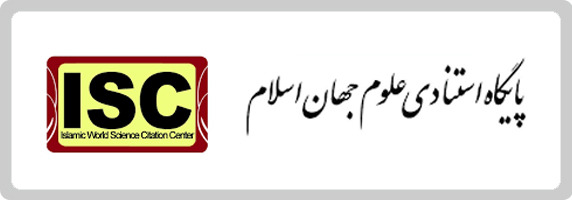Designing a Professional Ethics Model for Educational Managers with an Islamic–Iranian Approach
Keywords:
professional ethics, educational managers, Islamic–Iranian approach, individual competence, ethical strategiesAbstract
This study aimed to design and validate a professional ethics model for educational managers based on individual, organizational, and environmental factors within an Islamic–Iranian framework. The research used an exploratory mixed-method design. In the qualitative phase, semi-structured interviews were conducted with 21 educational experts and analyzed through open, axial, and selective coding using grounded theory. In the quantitative phase, the proposed model was tested using confirmatory factor analysis and structural equation modeling on data collected from 316 school principals in Tehran. A researcher-made questionnaire based on qualitative findings was used as the main instrument. The results indicated that the final model had an acceptable fit (CFI=0.99, GFI=0.96, RMSEA=0.054, χ²/df=2.10). Ethical performance (R²=0.61) and ethical behavior (R²=0.42) had the highest explained variance. Micro strategies (β=0.36) and macro strategies (β=0.25) had significant direct effects on individual enhancement, while individual competence (β=0.10) and ethical attitudes (β=0.09) affected it indirectly through managerial strategies. Environmental conditions and individual characteristics indirectly influenced environmental outcomes. Professional ethics among educational managers is a multidimensional construct shaped by the interaction of personal, organizational, and contextual elements. The findings highlight the importance of ethical training, policy development, and moral awareness as key mechanisms for promoting professional ethics within Iran’s educational system.
Downloads
References
Ahmadian, Z., Zareian, A., Azizi, M., Jahandari, P., Zargar Bolay Jam, S., & Ganjizadeh, H. R. (2022). The Mediating Role of Happiness and Professional Ethics in the Relationship between Quantum Leadership, Organizational Health, and Quality of Work Life in the University of Medical Sciences, Army of the Islamic Republic of Iran. Ibn Sina, 24(3), 4-14. https://ebnesina.ajaums.ac.ir/browse.php?a_id=1140&sid=1&slc_lang=en
Astereki, S., Mehrdad, H., & Ghobadian, m. (2022). Identifying the components of the model of professional competencies of educational managers of education organization. Educational Leadership & administration, 2(16), 109-134. http://sanad.iau.ir/fa/Article/856946
Jamshidpour, M., & Moghaddam, Z. (2023). Studying the relationship between organizational culture and professional ethics of managers with the mediation of teacher accountability in elementary schools. 17th International Conference on Psychology, Counseling and Educational Sciences, https://en.civilica.com/doc/1762728/
Kalantari, E., & Basijeh, I. (2021). Measuring Components of Professional Ethics in Banking from the Perspective of Bank Employees in Shiraz. Islamic Finance and Banking Studies, 7(17), 109-122. https://jifb.ibi.ac.ir/article_158639.html?lang=en
Kalantari, E., & Bassijeh, A. (2021). Measuring the Components of Professional Ethics in Banking from the Perspective of Bank Employees in Shiraz. Quarterly Studies in Banking Management and Islamic Banking, 7(17), 109-122. https://doi.org/10.22034/jifb.2022.304675.1294
Majdzadeh, M., Hoveyda, & Rajaei, P. (2019). The Structural Model of the Relationships between Academic Managers' Ethical Leadership and the Educational Performance of Faculty Members with the Mediating Role of Their Professional Ethics in the Comprehensive Branches of Islamic Azad University. Scientific-Research Bi-monthly Journal of Educational Strategies in Medical Sciences, 11(6), 65-67.
Mirzaei Ganjgah, A., & Moini Kia, M. (2023). Investigating the Role of Professional Ethics of Managers and Job Anchors on Employees' Content Plateau with the Mediation of Employees' Psychological Empowerment in Universities. Applied Educational Leadership, 4(3), 73-92. https://doi.org/10.22098/ael.2023.10601.1089
Mirzakhan, M., Mahmoudi, A. H., & Eftekharzadeh, F. (2015). Investigating the Components of Professional Ethics of Educational Deputies and the Perspectives of Managers and Educational Deputies in High Schools of District 5 of Tehran Education in the 2014-2015 Academic Year Islamic Azad University, Central Tehran Branch, Vali-e-Asr (AJ) University Complex - Faculty of Psychology and Educational Sciences].
Mohammadi Fomani, M., Sharifi, A., & Etemad Ahari, A. a. (2024). Development, Validity, and Reliability Assessment of the Professional Ethics Scale for Faculty Members of Farhangian University [Research Article]. Iranian Journal of Educational Sociology, 7(2), 8-15. https://doi.org/10.61838/kman.ijes.7.2.2
Momtaz, M., Rostam Nia, M., Vosoogh, M., & Karami, M. (2025). Professional ethics and the challenges of teaching. The Second National Conference on Humanities with a New Approach and the First International Research Conference of Modern Teachers, Astara. https://en.civilica.com/doc/2298415/
Moradi, K. (2020). The Role of Professional Ethics in Enhancing Employee Work Conscience. 3rd International Congress of Innovation and Research in Humanities and Islamic Sciences, https://en.civilica.com/doc/1181515/
Ne'mati, M., & et al. (2022). An Ethical Analysis of Administrative Corruption Based on Islamic Principles. Professional Ethics Research, 5(2), 83-101.
Rahimi, R., Vahdat, R., & Sameri, M. (2024). Structural Equation Modeling of Professional Ethics Based on Social Responsibility, Organizational Transparency, and Organizational Commitment With the Mediating Role of Social Cynicism. Jsied, 175-195. https://doi.org/10.61838/jsied.4.4.11
Seyfi, S., Gorji zadeh, D., & Khoshkar, F. (2024). The effect of auditors' competency, professional ethics and diversity of auditors signing audit report on the quality of financial reporting in the stock exchange from. Journal of Accounting and Management Vision, 7(88), 43-70.
Shabani Azadbani, M., & Safari, M. (2021). The Relationship Between Professional Ethics and Conflict Management in High School Managers in Western Mazandaran Province. Quarterly Journal of Management and Educational Perspective, 2(4). https://www.jmep.ir/article_114516.html
Shabani, R., Khorshidi, A., Abbasi, L., & Fathivajargah, K. (2018). Presentation of competency model for primary education managers of Tehran. Journal of Research in Educational Systems, 12(Special Issue), 79-94. https://www.jiera.ir/article_64989_2cad8a59e30350384c04d9bffe6db7f6.pdf
Shirvani, T., Omidi, A., & Safari, S. (2024). Compilation of Organizational Virtue Model based on Professional Ethics and Organizational Justice of Employees of Sports and Youth Departments of Chaharmahal and Bakhtiari Province. Human Resource Management in Sports, 11(1), 113-130. https://doi.org/10.22044/shm.2023.13653.2584
Wang, Y. (2024). Ethical Concepts in the Tao Te Ching and Professional Ethics Education: Principles, Challenges, and Opportunities. The Educational Review Usa, 8(2), 232-236. https://doi.org/10.26855/er.2024.02.006
Yazdanshenasi, M. (2024). The Role of Responsibility and Professional Ethics in the Success of Teachers and Its Effects on the Quality of Education and Learning. https://civilica.com/doc/1977078/
Zhang, W. (2024). Ethical Dilemmas in Accounting: A Comprehensive Analysis of Professional Ethics. Academic Journal of Business & Management, 6(2), 137-145. https://doi.org/10.25236/AJBM.2024.060220
Downloads
Published
Submitted
Revised
Accepted
Issue
Section
License
Copyright (c) 2025 معصومه مقیمی فیروز آباد, حمید رحیمیان, عباس عباسپور (نویسنده)

This work is licensed under a Creative Commons Attribution-NonCommercial 4.0 International License.






